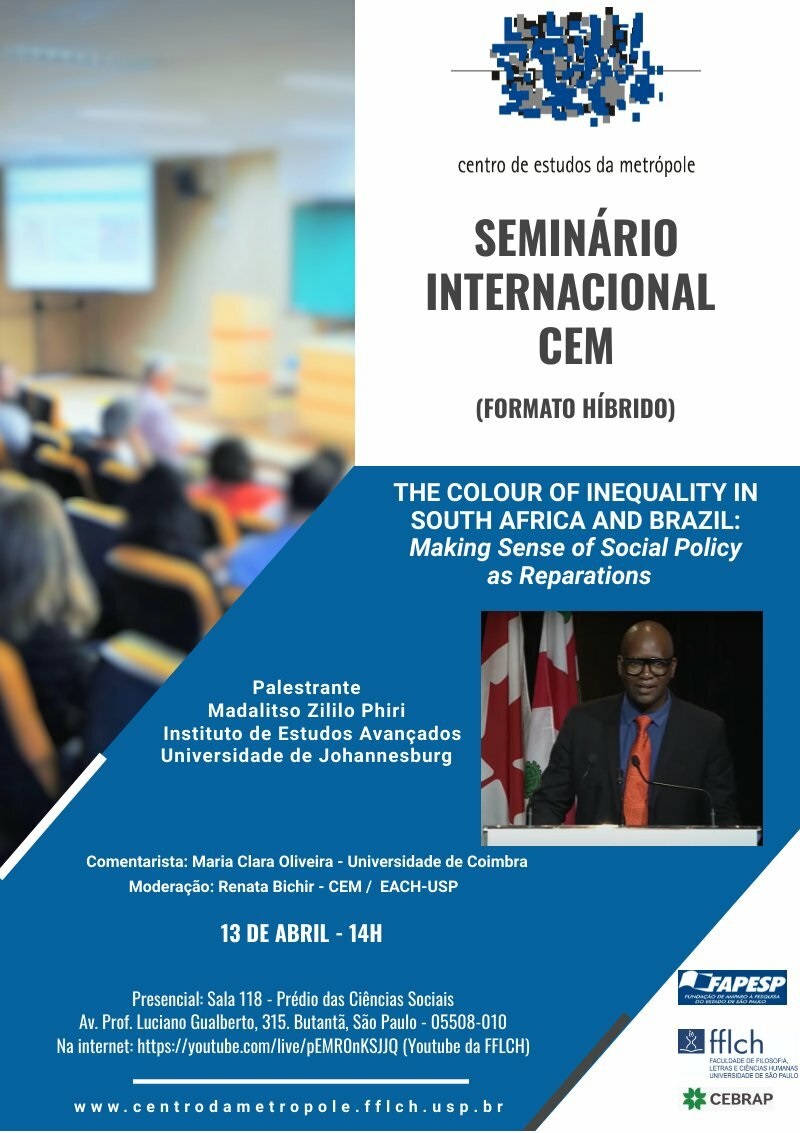difusão científica Seminários e Agenda The Colour of Inequality in South Africa and Brazil: Making Sense of Social Policy as Reparations
The Colour of Inequality in South Africa and Brazil: Making Sense of Social Policy as Reparations
O próximo Seminário Internacional CEM-Cepid/Fapesp será realizado dia 13 de abril, ás 14h, na Faculdade de Filosofia, Letras e Ciências Humanas da Universidade de São Paulo (FFLCH-USP). Madalitso Zililo Phiri, sociólogo pan-africano e pesquisador de pós-doutorado no Instituto de Estudos Avançados da Universidade de Joanesburgo, apresenta o seminário "The Colour of Inequality in South Africa and Brazil: Making Sense of Social Policy as Reparations". O formato será híbrido: presencial, na sala 118 do Prédio das Ciências Sociais da FFLCH-USP, e online, pela página da FFLCH no Youtube (https://youtube.com/live/pEMR0nKSJJQ). A apresentação será em inglês, sem tradução simultânea. Não é preciso fazer inscrição.
Abstract do seminário (em inglês):
Title of Presentation: The Colour of Inequality in South Africa and Brazil: Making Sense of Social Policy as Reparations.
University of São Paulo, Centre for Metropolitan Studies, Seminar Presentation
South Africa’s and Brazil’s social policies attempt to address the residues of institutional poverty, inequality, and unemployment. South Africa remains deeply unequal and polarized despite government commitments to undo centuries of social stratification resulting from colonial legacies and post-apartheid policy constraints. On the other hand, under the Partido dos Trabalhadores (PT) — Workers’ Party, led government Brazil’s social assistance programmes like the Bolsa Familia was viewed as a model to reduce inequality to be emulated across most countries in the Global South. Can social policy resolve the residuals and contradictions of trans-historical inequalities in South Africa and Brazil as aspirant democracies in the Global South that aim to forge a new social contract under the epoch of neoliberal capitalism? My research departs from the theoretical prism of studying welfare regimes through the Eurocentric of the Welfare Regime Approach”, rather proposes the view of thinking about “Social Policy as Reparations”. The two countries offer a compelling comparison through shared histories of colonial domination, slavery, and anti-black racism. Drawing from 45 in-depth interviewees I challenge hagiographic representations of social policies by centering Black Political Thought and theorizing with my interlocutors, the beneficiaries of these countries’ social welfare programmes. The commodification of social provisioning fails to challenge institutional legacies of anti-black racism which are foundational to citizenship in both South Africa and Brazil. Thinking about Social Policy as reparations provides potent articulations of inaugurating a post-imperial world order. Poverty and inequality are sustained as a result of policy decisions carved out of imperial violence.
Confira aqui as últimas publicações do pesquisador:
2022. 'Against Imperial Social Policy: Recasting Mkandawire's Transformative Ideas for Africa's Liberation, Critical Sociology, https://journals.sagepub.com/eprint/SXY38A8VH7VQZRWF98EG/full
2022. ‘Beyond Academic Imperialism in Comparative Studies: Methodological Reflections’. Journal of Higher Education in Africa, 19(2): 27-55, https://journals.codesria.org/index.php/jhea/article/view/2178
2021. 'The South African Pandemic of Racial Capitalism'. Monthly Review, 73, No.5 (October): 36-50, https://monthlyreviewarchives.org/index.php/mr/article/view/6078
2020. 'History of Racial Capitalism in Africa: Violence, Ideology and Practice'. The Palgrave Handbook of African Political Economy, Oloruntoba and Toyin Falola (eds.). Basingstoke, UK: Palgrave, pp.63-82. https://www.palgrave.com/gp/book/9783030389215




